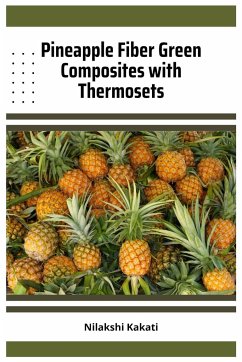Pineapple fiber-based green composites with thermoset polymers have emerged as a sustainable and eco-friendly alternative to conventional composites that are mostly derived from non-renewable resources. This type of composite material is reinforced with natural fibers extracted from pineapple leaves, which are abundantly available and cost-effective. The use of pineapple fiber not only reduces the dependence on synthetic fibers but also promotes the use of bio-based materials, which are biodegradable and renewable. The mechanical, thermal, and physical properties of the composites depend on the fiber-matrix adhesion, interfacial bonding, composite processing, and composite structure. The properties of the composites can be optimized by controlling the processing parameters and composite morphology. The mechanical properties, such as tensile strength, flexural strength, and impact resistance, of the composites can be enhanced by improving the fiber-matrix adhesion and interfacial bonding. Composite characterization techniques, such as X-ray diffraction, scanning electron microscopy, and transmission electron microscopy, can be used to study the composite morphology and structure. The thermal properties, such as thermal stability and heat resistance, of the composites can be improved by incorporating thermoset polymers. The use of thermoset polymers provides excellent chemical and mechanical stability to the composite material. The eco-friendly nature of pineapple fiber-based green composites has opened up a wide range of potential applications, including construction, automotive, aerospace, packaging, and consumer goods. The development of composite technology and composite engineering has enabled the manufacturing of composites with improved performance, durability, and reliability. The composite industry is continuously innovating and designing new composite materials to meet the growing demand for sustainable and eco-friendly materials. Composite testing and standards play a crucial role in ensuring the sustainability and safety of the composite material. The composite material must be tested for its mechanical, thermal, and physical properties, and toxicity before it can be used in applications. The composite sustainability can be further enhanced by recycling and disposing of the composite material in an eco-friendly manner. In conclusion, the development of pineapple fiber-based green composites with thermoset polymers has provided a sustainable and eco-friendly alternative to conventional composites. The use of natural fibers and thermoset polymers has resulted in the development of composite materials with improved mechanical, thermal, and physical properties. The potential applications of green composites are vast, and the composite industry is continuously innovating and designing new composite materials to meet the growing demand for sustainable and eco-friendly materials.
Hinweis: Dieser Artikel kann nur an eine deutsche Lieferadresse ausgeliefert werden.
Hinweis: Dieser Artikel kann nur an eine deutsche Lieferadresse ausgeliefert werden.








